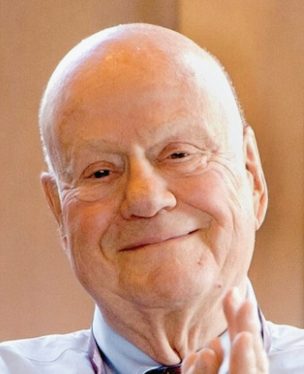
Forrest Mars, Jr.
Class of 2021
Friends and family called Forrest E. Mars, Jr. a visionary who held a strong set of business values that he carried with him in work and life, making him a positive force in the world. He will be remembered as a businessman and philanthropist.
Forrest was born in Oak Park, IL, on August 16, 1931, the eldest son of Forrest Sr. and Audrey, and the grandson of Frank C. Mars, the founder of Mars, Inc. He grew up with siblings John and Jacqueline.
He attended the Hotchkiss School before going on to earn a Bachelor of Arts & Science in Economics from Yale University in 1953. He then attended graduate school at the New York University Leonard N. Stern School of Business, earning an MBA in 1958.
He started his business career as an auditor for Price Waterhouse after serving as a finance officer in the U.S. Army for two years. Forrest joined Mars as a financial staff officer for the M&M’s brand in 1959.
In 1962, Forrest moved with his family, which would soon grow to include four daughters — Victoria, Valerie, Pamela and Marijke — to the Netherlands, where he oversaw the construction of what is now one of the largest chocolate factories in the world.
Forrest then moved to France in 1966 to become the managing director of Mars France. It was during his tenure here that Mars expanded its pet food business and Forrest began bringing Mars’ portfolio of products to new territories.
In 1970, the family returned to the U.S. where Forrest assumed the role of Vice-President, overseeing the company’s confectionery operations group. He worked alongside his brother John and the two eventually became co-presidents of Mars.
He loved manufacturing and connecting with Mars Associates on the factory floor. He was intrigued by the processes and the possibilities for leveraging them to create innovation and a competitive advantage.
During his time as president, Forrest, along with his siblings, established what has become the driving force behind every decision that is made at the company — The Five Principles of Mars. These values — Quality, Mutuality, Responsibility, Efficiency and Freedom — were first taught to the siblings by their father.
In 1983, when specific knowledge around cocoa farming best practices did not yet exist, he purchased a cocoa farm in Brazil. This led to an in-depth examination into disease and other factors affecting cocoa supply. This research continues to benefit small holder cocoa farmers to this day.
In 1998, working with the Smithsonian Tropical Research Institute and the Smithsonian Migratory Bird Center in Panama, Forrest initiated the first global working session to discuss the future of cocoa. Representatives from 22 countries, the World Bank, the United Nations Development Program, USAID, academics and members of NCA, came together to collaborate on this unprecedented effort.
Forrest retired in 1999, recognized as having helped navigate demand for the company’s confectionery brands. He is also credited as a driving force in Mars’ successful push into markets in Europe, Asia and South America.
Despite his retirement, Forrest continued to mentor and guide many of Mars’ business leaders. He served as a member of the Board of Directors and remained active within the Mars Foundation for many years after he stepped away from the day-to-day business.
Forrest was also a strong supporter of Mars’ investment in sequencing the cocoa genome, which opened the door to greater understanding of how to cultivate healthy cocoa trees. Instead of keeping the information proprietary, Mars shared the learnings publicly in service of advancing global research.
In retirement, Forrest supported environmental preservation efforts and numerous American history projects.
He was an adventurer who loved exploring and would take his expedition ship to some of the most remote places across the globe. He often joined an annual trip for students from his alma mater, The Hotchkiss School, to Antarctica.
Forrest died on July 26, 2016, at the age of 84.